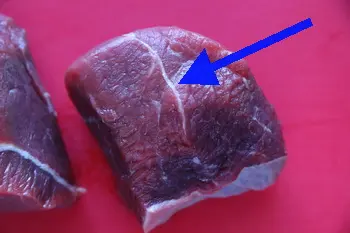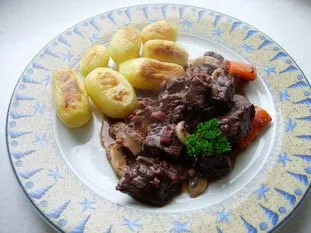This site uses only a few technical cookies necessary for its operation. By continuing to browse, you accept their use.
To find out more...
To find out more...
The so-called "nervous" meats

You've probably heard this before, we're talking about "nervous" meat, or meat with nerves, to describe what is indicated by the blue arrow on the left.
This is a piece of beef, and what we call a nerve is not a nerve, it is in fact collagen (chemists sometimes call it a "collagen sink"), a protein that is found in varying amounts in some of the meats we eat.
But we'll continue to call them "nerves" for the rest of this post, it will be simpler.
This is a piece of beef, and what we call a nerve is not a nerve, it is in fact collagen (chemists sometimes call it a "collagen sink"), a protein that is found in varying amounts in some of the meats we eat.
But we'll continue to call them "nerves" for the rest of this post, it will be simpler.
38 K 4.5/5 (23 reviews)
Keywords for this post:MeatNervesCollagenCookingGelatinLast modified on: April 16th 2021
The so-called "nervous" meats
Let's say it straight, even if it's not nerves, it's not pleasant to eat, it's both hard and elastic in the mouth, in short if you find it while chewing a piece of meat, steak for example, you'll feel the difference in texture and taste (it doesn't have any taste in fact)
So naturally, if you prepare a meat before cooking, you try to eliminate as much as possible these nerves to see a certain harmony of texture. A lot of cutting to be done, it's a lot of work, I must admit.
Well, it's not as binary as that, it turns out that this collagen under the action of heat, cooking, long, we are talking about at least 2 hours, this collagen is naturally transformed into gelatin, and therefore on the one hand it loses completely its hardness, it melts in fact, but in addition it brings a natural binder to your preparation.
This is one of the secrets of meat dishes that are cooked for a long time, I am thinking in particular of beef bourguignon, blanquette de veau or carbonnade, it is not obvious but it is not at all necessary to choose a first choice meat, on the contrary a cheap and slightly nervous meat will be fine, no need to make a thousand cuts to eliminate the nerves, better it will even participate in the holding of your sauce, thanks to its natural gelatin contribution.
That's why if you ask your butcher for a bourguignon meat, for example, he might offer you less noble, more economical cuts (e.g. skirt steak, chuck) and a bit nervous, no worries, on the contrary.
This is the advantage of these dishes which must cook for at least 2 hours, but which can very well do it twice or three times or even more, under cover, over a low heat, where the meat gently confit and the tastes reveal themselves more and more, for our greatest gustatory pleasure.
In summary: The presence of nerves (in fact collagen) is not a problem for long-cooked meats, it can even be an asset, thanks to the slow transformation of collagen into gelatin.
So naturally, if you prepare a meat before cooking, you try to eliminate as much as possible these nerves to see a certain harmony of texture. A lot of cutting to be done, it's a lot of work, I must admit.
Okay, but where is the trick?
Well, it's not as binary as that, it turns out that this collagen under the action of heat, cooking, long, we are talking about at least 2 hours, this collagen is naturally transformed into gelatin, and therefore on the one hand it loses completely its hardness, it melts in fact, but in addition it brings a natural binder to your preparation.
This is one of the secrets of meat dishes that are cooked for a long time, I am thinking in particular of beef bourguignon, blanquette de veau or carbonnade, it is not obvious but it is not at all necessary to choose a first choice meat, on the contrary a cheap and slightly nervous meat will be fine, no need to make a thousand cuts to eliminate the nerves, better it will even participate in the holding of your sauce, thanks to its natural gelatin contribution.

That's why if you ask your butcher for a bourguignon meat, for example, he might offer you less noble, more economical cuts (e.g. skirt steak, chuck) and a bit nervous, no worries, on the contrary.
This is the advantage of these dishes which must cook for at least 2 hours, but which can very well do it twice or three times or even more, under cover, over a low heat, where the meat gently confit and the tastes reveal themselves more and more, for our greatest gustatory pleasure.
In summary: The presence of nerves (in fact collagen) is not a problem for long-cooked meats, it can even be an asset, thanks to the slow transformation of collagen into gelatin.
Lasts posts
XO Cognac Explained: Meaning, Aging, and Flavor Profile
XO Cognac always goes beyond the labels on the bottle: it is often associated with tradition and quality. You get to appreciate the artistry, character and ageing process when you understand what defines this smooth Cognac. The section below tackles everything about XO Cognac, from complex flavour...January 28th 2026837 Sponsored article
Butter vs. grease
We often read in a recipe where a pastry is put into a mould that, just before pouring, the mould should be buttered or greased. But what's the difference between these 2 terms?December 1st 20252,5585
Getting out of the fridge early
Very often when you're cooking, you need to take food or preparations out of the fridge, to use them in the recipe in progress. There's nothing tricky about this: you just take them out of the fridge and use them, usually immediately, in the recipe. But is this really a good method?November 24th 20251,6635
Who's making the croissants?
When you look at a bakery from the outside, you naturally think that in the bakery, the bakers make the bread, and in the laboratory, the pastry chefs make the cakes. It's very often like that, with each of these professions having quite different ways of working, but sometimes there's also one...November 23th 20251,503
Oven height
When we put a dish or cake in the oven, we naturally tend to put it on the middle shelf, and that's what we usually do. But in some cases, this position and height can be a little tricky, so let's find out why.October 8th 20255,0295
Other pages you may also like
Tranché, dissociated, failed, in short... missed!
When preparing a sauce or a cream, there's always a (small) risk that the creamy preparation you're working on will suddenly separate into two parts of different textures: a liquid part, for example, and a more or less solid part, or even become lumpy. It's terribly frustrating, but we'll see...June 19th 202314 K5
How to avoid lumps
You've probably come across this unpleasant phenomenon where, when you try to incorporate an ingredient (usually a solid or powder) into a preparation (usually a liquid), the mixture doesn't mix properly and you end up with little "balls" or little lumps of the solid part that refuse to mix with the...October 9th 202023 K4.8
Raising (or leavening) agents
When we want to make a dough or batter rise when baking, either in patisserie or bread-making, we need to use a raising agent or leavening agent, one of which is called leaven. In the context of baking, a raising agent is simply what "makes something rise". It is a substance which, when added to...June 16th 202157 K4.8
Making the most of seeds: Dry roasting
In cooking, and particularly in baking, there are a lot of seeds we can use, such as linseed, sesame, poppy, etc. Usually, recipes simply say to add them just as they are to the mixture or dough. To make a seeded loaf, for example, prepare a plain bread dough as usual, then, towards the end of...January 30th 201563 K4.0
What is the difference between bakery and patisserie?
This is a question that you may well have asked yourself and which I will attempt to answer. In France the two trades of "boulangerie" (bakery) and "pâtisserie" (patisserie and confectionery) have always been quite distinct, but where exactly do the boundaries lie? .February 7th 2017135 K 14.1
Post a comment or question
Follow this page
If you are interested in this page, you can "follow" it, by entering your email address here. You will then receive a notification immediately each time the page is modified or a new comment is added. Please note that you will need to confirm this following.
Note: We'll never share your e-mail address with anyone else.
Alternatively: you can subscribe to the mailing list of cooling-ez.com , you will receive a e-mail for each new recipe published on the site.









